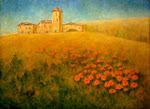As I’ve stated previously, translating proverbs can be tricky. Here are 3 Italian proverbs that relate to conscience.
The first is straightforward:
“Alla coscienza nessuno può sottrarsi.” This means: “You can’t escape your conscience.”
The next one is still easily translated: “Una buona coscienza è un buon cuscino.” Literally, this means: “A good conscience is a good cushion,” but it’s meant to imply: “A good conscience is a soft pillow.” That makes sense. If your conscience is clear, you’ll sleep without difficulty.
This third proverb, which I’m told is of Tuscan origin, is the brain-squeezer: “Lui ha la coda di paglia.”
Literally, this means: “He has the straw’s tail.” Say what?
What does having the tail of a piece of straw have to do with conscience?
In Tuscany, to be accused of having “la coda di paglia” means you have a guilty conscience. Maybe the guilty person in question is playing at drawing straws: he draws the short straw but instead of revealing this “losing” straw, he conceals the short end (tail) of the straw; however, the contrite look on his face exposes his guilty conscience. I don’t know if this conclusion is correct, but it’s the only one I could come up with. If you have a different one, let me know.
Ciao!
Welcome
Many artists dream about painting in Italy. Now, as retiring baby-boomers are increasingly taking up “brush and pallet knife,” more than ever, painting in Italy is the “thing.” Every day, a new “Artist’s” tour of Italy crops up in travel sections of the newspaper and on the Internet. But there still remains a majority of artists who prefer to “go it alone.” They are independent in their artistic styles, and prefer to be independent regarding their travels in Italy . This blog intends to target these free spirited artists who still need guidance to the best places to paint, especially those idyllic gems that are little known and less traveled. Certainly, independent travelers who are not artists will also benefit from this blog.
With a few exceptions, this blog is not a guide to restaurants, lodging, rental cars, or shopping, (except for art supplies.)
Sprinkled among the posts are: my paintings, and a few Italian proverbs and poems written by notable Italian authors for whom I work as a translator.
Please visit my website to view my original art:
http://www.pamelaallegretto-franz.com/
Giclee prints of my paintings, ranging from greeting size to poster size, can be purchased at:
http://pamela-allegretto.fineartamerica.com/
With a few exceptions, this blog is not a guide to restaurants, lodging, rental cars, or shopping, (except for art supplies.)
Sprinkled among the posts are: my paintings, and a few Italian proverbs and poems written by notable Italian authors for whom I work as a translator.
Please visit my website to view my original art:
http://www.pamelaallegretto-franz.com/
Giclee prints of my paintings, ranging from greeting size to poster size, can be purchased at:
http://pamela-allegretto.fineartamerica.com/
Tuesday, May 5, 2009
Subscribe to:
Post Comments (Atom)











No comments:
Post a Comment
Thank you for your comment. Grazie per i complimenti.
Note: Only a member of this blog may post a comment.